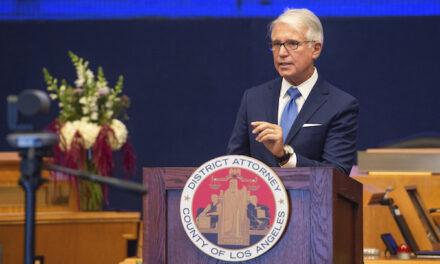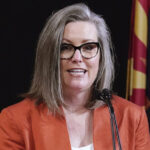San Jose is set to become the largest U.S. city to ban natural gas from nearly all new construction as part of a growing movement to usher in an era of all-electric energy to fight climate change.
But some advocates worry that a special exemption added by the city at the eleventh hour could threaten the overall intention of the ban.
The San Jose City Council on Tuesday is expected to approve a proposal to prohibit natural gas in new commercial and high-rise residential buildings beginning in August 2021. The action would expand an ordinance that went into effect in January barring natural gas in new single-family homes, detached granny flats and low-rise multifamily buildings up to three stories.
“San Jose is really making history, and I do hope that local governments across the state and country see this as a model for the kind of ambitious policies we need in our cities to truly combat climate change,” said Olivia Walker, a research associate with the National Resources Defense Council.
While natural gas was once viewed as a positive alternative to more destructive fossil fuels such as coal, it is now seen by many as an inferior substitute to electricity. Amid a national movement to fight global warming, San Jose would join nearly two dozen cities across the state that require new buildings to be all-electric.
San Francisco earlier this month passed a natural gas ban on all new construction, affecting more than 54,000 homes and 32 million square feet of commercial space in the city’s development pipeline. Berkeley paved the way in July 2019 when it became the first city in the country to prohibit natural gas.
In a memo to the San Jose City Council, the city’s chief sustainability officer, Kerrie Romanow, said expanding the city’s natural gas ban would improve indoor air quality and significantly reduce future greenhouse gas emissions from the building sector.
Based on the city’s development projections over the next five years, the natural gas ban would offset approximately 608,000 tons of carbon dioxide emissions.
In early 2018, San Jose announced plans to become one of the first cities in the country to reduce greenhouse gas emissions to levels outlined in the Paris Agreement. Later that year, Bloomberg Philanthropies chose San Jose for a two-year program aimed at helping cities meet their climate goals. The city has launched its own community choice energy program and aims to produce enough solar power to run 250,000 homes by 2040.
The ordinance is also expected to assist the city in reaching its ambitious climate goals, including to ensure all new residential buildings by 2020 and commercial buildings by 2030 are zero net energy, meaning that the amount of energy used by the building is equal to the amount of renewable energy created on-site.
“It’s important for us to maintain our climate leadership,” Mayor Sam Liccardo said in a recent interview. “As the largest city in Silicon Valley, the country looks to us to be pushing forward on initiatives that will have an impact in reducing greenhouse gas emissions.
“I’m grateful that we’ve got a very engaged community and great partners that both push us and are receptive to being pushed.”
San Jose’s ordinance expansion would not affect existing homes or commercial buildings.
It also would exempt hospitals, new dwelling units attached to an existing home and facilities with a distributed energy source — or electrical generation and storage performed on-site through a variety of small, grid-connected or distribution system-connected devices.
“Limited hardship exemptions” will be available for new food service establishments and manufacturing and industrial facilities until Dec. 31, 2022. New buildings applying for an exemption, though, would still be required to put in the infrastructure and hookups for all-electric appliances to ensure an easier transition from natural gas to electric equipment in the future.
The exemption for facilities with a distributed energy source is facing significant scrutiny. According to the group Mothers Out Front Silicon Valley, Bloom Energy — a San Jose-based publicly-traded fuel cell company with large customers such as Apple and PayPal — negotiated an exemption from the all-electric code, describing its fuel cells as a vital source of backup power in case of outages. The company’s fuel cells generate electricity using mainly natural gas and emit more than three times as much carbon dioxide as power from the city’s utility, San Jose Clean Energy, according to city and Bloom figures.
Earlier this year, Bloom won a legal battle against the city of Santa Clara after it tried to ban the company’s cells.
Hoai-An Truong, a member of Mothers Out Front Silicon Valley’s leadership team, said in a letter to the council that the exemption would “severely undermine the intent of the proposed gas prohibition.”
“We are strongly opposed to any exemptions allowing significant continuous fossil gas use in place of clean energy in new construction,” Truong wrote in a letter to the council. “… The late attempt of a fossil fuel company to tamper with this policy is inappropriate.”
The company, however, argues that banning its pipeline infrastructure will “limit the state’s ability to fully decarbonize.”
“The roadmap to meeting the State’s carbon-reduction goals should include a variety of policies and technologies to enable a clean, reliable and affordable transition,” Bloom’s new executive Vice President Carl Guardino wrote in a letter to the city council. “Intermittent renewable resources must be paired with reliable generation to keep the lights on and business running.”
Others are less receptive to the city introducing any new mandates on the building and construction industry, citing concerns about increasing costs and differing views on how harmful natural gas really is to the environment.
Myron Crawford, a government affairs specialist with the real estate development firm Berg & Berg Enterprises, Inc., urged the council in a letter not to expand its ban on natural gas, arguing it will lead to higher home prices and fuel an exodus of people leaving California.
“Just because another City passes a prohibition on natural gas is no reason for San Jose to do it,” Crawford wrote in the letter. “… Berkeley’s natural gas ban adds to the ever-increasing cost of homeownership in California, which has already been stressed by eco-demands.”
___
(c)2020 the San Jose Mercury News (San Jose, Calif.)
Visit the San Jose Mercury News (San Jose, Calif.) at www.mercurynews.com
Distributed by Tribune Content Agency, LLC.
—-
This content is published through a licensing agreement with Acquire Media using its NewsEdge technology.



















THEN TRY TO recall their sorry behinds… IF at all possible that is.
Look at Ohio. They’re trying to IMPEACH DEWINE for executive over-reach/abuse of power, for what HE has done lockdown wise.. BY THAT metric, BOTH CA and WA governors need to be in jail!
Because facts are a curse word to leftists.
You actually think these fools, THOUGHT of those questions?
The Democrat Party’s agenda and history: “Rule AND Ruin”.
* Rule by ANY means and cost.
* Ruin anyone and everything that has any opposition to the will of the Democrat Party Cult.
The dishonorable Democrat Party revolves around and its philosophy is based on Control, Lies, Hate, Cons, Deceptions, Immorality and the lack of Integrity, Ethics or Honor.
And everywhere they DO rule, they have ruined!
Maybe we should all invest in STERNO (you know, the flame source in a can)…
They will have to make HUGE versions of these fuel cans to fire all the Chinese Restaurants’ wok cooking.
Can’t wait to see all these Liberals BAN on Chinese Restaurants!
You hit the nail square on the head. I read years ago that the only energy the left likes is really expensive energy. They used to love gas when it cost more. Now the it’s cheaper, “GET RID OF GAS!!!” It makes not sense. Outside of nuclear, it is the cleanest and the cheapest.